א מִזְמ֥וֹר לְדָוִ֑ד בְּ֝בָרְח֗וֹ מִפְּנֵ֤י ׀ אַבְשָׁל֬וֹם בְּנֽוֹ׃ |
1 סאלמו די דויד. קואנדו פﬞוייו דילאנטי לי אבשﬞלום סואיזﬞו׃ |
ב יְ֭הוָה מָֽה־רַבּ֣וּ צָרָ֑י רַ֝בִּ֗ים קָמִ֥ים עָלָֽי׃ |
2 ה׳ ,קואנטו סי מוגﬞיגואן מיס אנגוסטייאדﬞ! וריסמוגﬞוס סי אליבﬞאנטאן קונטרה מי׃ |
ג רַבִּים֮ אֹמְרִ֪ים לְנַ֫פְשִׁ֥י אֵ֤ין יְֽשׁוּעָ֓תָה לּ֬וֹ בֵֽאלֹהִ֬ים סֶֽלָה׃ |
3 מוגﬞוס דיזין פור מי אלמה. נון איי םאלבﬞאסייון פארה אילייה קון איל דייו. סלה׃ |
ד וְאַתָּ֣ה יְ֭הוָה מָגֵ֣ן בַּעֲדִ֑י כְּ֝בוֹדִ֗י וּמֵרִ֥ים רֹאשִֽׁי׃ |
4 מה טו ה׳ איריס מאמפארו אה מי. מי אונרה אי איל קי אינאלטיסי מי קאבﬞיסה׃ |
ה ק֭וֹלִי אֶל־יְהוָ֣ה אֶקְרָ֑א וַיַּֽעֲנֵ֨נִי מֵהַ֖ר קָדְשׁ֣וֹ סֶֽלָה׃ |
5 קון מי בוז אה ה׳ לייאמו. אי איל מי ריספונדי די סו מונטי סאנטו. סלה׃ |
ו אֲנִ֥י שָׁכַ֗בְתִּי וָֽאִ֫ישָׁ֥נָה הֱקִיצ֑וֹתִי כִּ֖י יְהוָ֣ה יִסְמְכֵֽנִי׃ |
6 ייו ייאזקו אי דואירמו אי אי דיספיירטו. פורקי ה׳ מי סוסטייני׃ |
ז לֹֽא־אִ֭ירָא מֵרִבְב֥וֹת עָ֑ם אֲשֶׁ֥ר סָ֝בִ֗יב שָׁ֣תוּ עָלָֽי׃ |
7 נון טימירי די מילארייאס די פואיבﬞלו קי סי פונין דירידﬞור קונטרה מי׃ |
ח ק֘וּמָ֤ה יְהוָ֨ה ׀ הוֹשִׁ֘יעֵ֤נִי אֱלֹהַ֗י כִּֽי־הִכִּ֣יתָ אֶת־כָּל־אֹיְבַ֣י לֶ֑חִי שִׁנֵּ֖י רְשָׁעִ֣ים שִׁבַּֽרְתָּ׃ |
8 אליבﬞאנטאטי ה׳! סאלבﬞאמי, מי דייו! פורקי טו איריסטי אה טודﬞוס מיס אינימיגוס סובﬞרי סו קישﬞאדﬞה. לוס דיינטיס די לוס מאלוס קיבﬞראסטי׃ |
ט לַיהוָ֥ה הַיְשׁוּעָ֑ה עַֽל־עַמְּךָ֖ בִרְכָתֶ֣ךָ סֶּֽלָה׃ |
9 קון ה׳ איס לה סאלבﬞאסייון. סובﬞרי טו פואיבﬞלו טו בינדייסייון. סלה׃ |
To the best of my ability, this is a faithful transcription of Psalms 3 from תהילים או לוס סאלמוס ; טריסלאד’אד’וס דיל לשון הקדש אין לה לינגואה ספרדית (Tehillim, or the Psalms, translated from the Holy language [Hebrew] into the Sephardic language, Estampado por Ǧ. Griffit 1852/3) from a digital copy made available by the Sephardic Studies Collection at the University of Washington. Please join me in making a complete transcription of this Ladino translation of Psalms. –Aharon N. Varady
Psalm 3:2-9 are part of the prayers for the Bedtime Shema. Psalms 3:9 is the eighth verse of V’hu raḥum in Pesukei Dezimra and is also found in the Havdalah.
Seder Avodat Yisrael (Seligman Baer, Roedelheim 1868) lists Psalms 3 to be recited on the Shabbat that Parshat Vayetsei is read.
Transcription Source


“תהלים ג׳ בלשון לאדינו | Psalms 3 by David in Ladino (Estampado por Ǧ. Griffit, ca. 1852/3)” is shared through the Open Siddur Project with a Creative Commons Public Domain Dedication 1.0 Universal license.
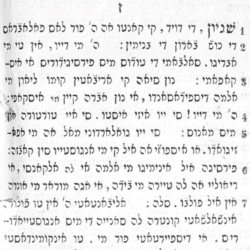
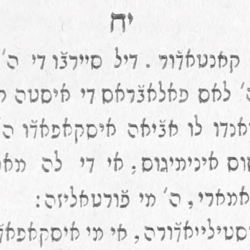

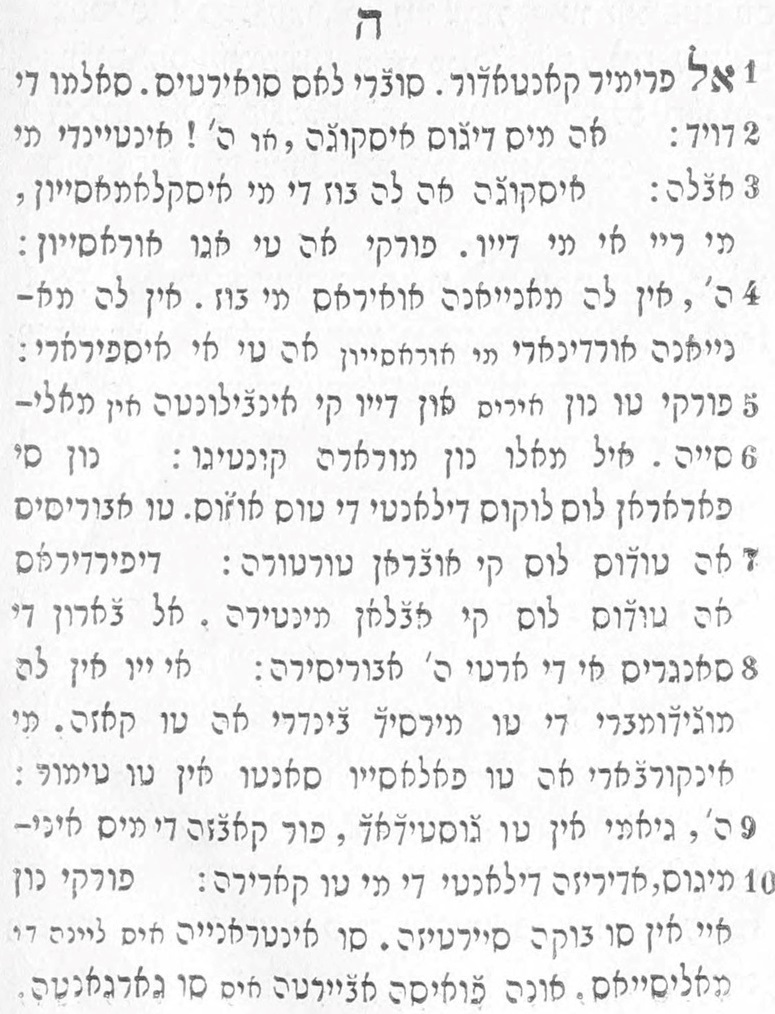


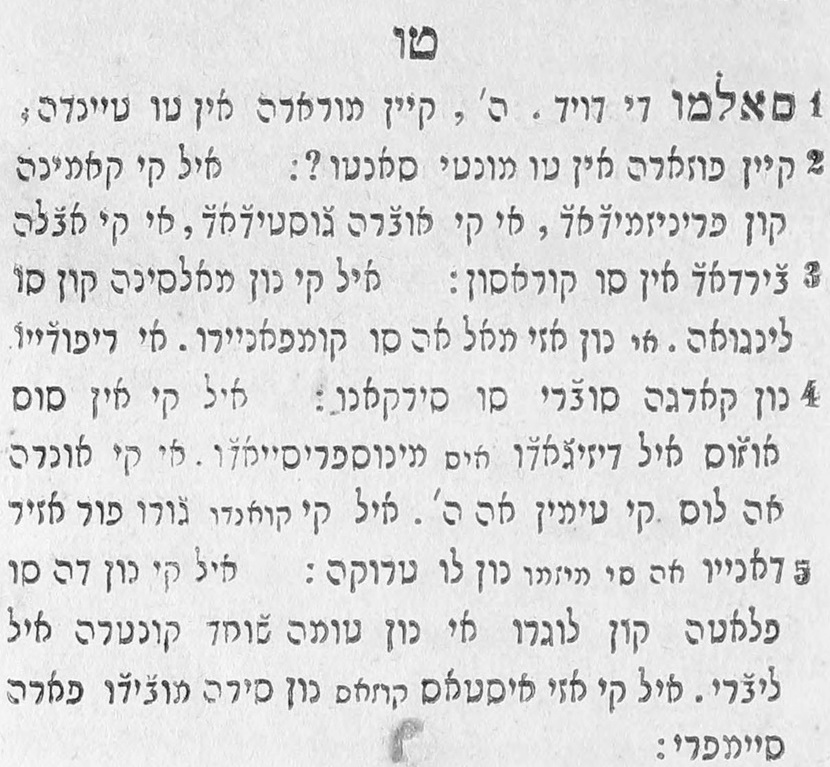
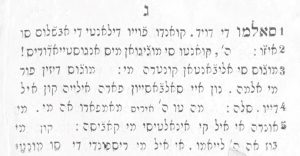


Comments, Corrections, and Queries